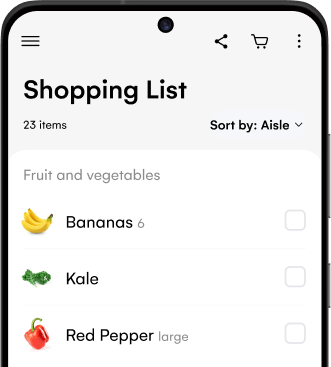Estimated reading time: 7 minutes
Everyone deserves to enjoy their food without complex feelings of guilt or shame. But eating for pleasure can invoke all kinds of complex feelings. Food can be a source of great pleasure and happiness. All around the world, food is pivotal in ceremonies, celebrations, and traditions. But most importantly, food is essential to keep you healthy. But food guilt is real.
Analyse nutritional information for any recipe

People aren’t born with negative feelings toward food. Often these feelings are developed over time and are learned from the environment. Wouldn’t it be great if you could control these negative emotions and enjoy your food without being accosted by guilt or shame?

Why are guilt and shame associated with food?
Guilt invokes a sense of self-blame as if you have done something wrong. Shame is deeper and more sinister and can cause someone to consider themselves a disgrace. You probably know the feeling: you’ve chosen the burger and fries over the salad and feel like you’ve failed. Or you punish yourself after overindulging at a party.
Over the last few years, diet culture has blossomed and perhaps even peaked. Almost simultaneously, the pop culture media has perpetuated its idealized notion of beauty. With social media even more popular than ever before, it’s unsurprising that so many of us associate guilt and shame with food, body image, and more. Beauty standards and dieting go hand in hand; this gave rise to the notion of “good” and “bad” foods. The so-called bad foods are high in sugar, fat, and calories.
This sort of labeling is enough in itself to induce guilt and shame for consuming such foods.
Who experiences guilt and shame around food?
In this study, the majority of participants – who are all female – experienced feelings of food guilt. Feelings of guilt were particularly prevalent in and around snacking between meals.
It’s not only women who experience negative feelings around food though. Men also experience feelings of guilt and shame around food. While experiencing guilt and shame around food isn’t enough to be diagnosed with an eating disorder, it is worth acknowledging that up to 40% of Americans with an eating disorder are men.
The more you experience guilt and shame around food, the greater the likelihood of resorting to emotional eating. Emotional eating is a type of eating that uses food to deal with emotions – sometimes negative, sometimes positive. While it’s not unusual for food to trigger emotions, especially as we associate it with so many major events and gatherings, using food to manage and cope with emotions can be problematic.
It is fair to say that almost everyone is susceptible to feelings of guilt and shame around food.

4 simple ways to enjoy food without guilt or shame
If feelings of guilt and shame around food consumption are left to marinade unchecked, they risk escalating into a full-scale eating disorder. Eating disorders affect approximately 9% of the world’s population.
If your food difficulties exceed guilt and shame, please consider consulting a doctor or speaking with a therapist for the sake of your health and well-being.
Here are 5 tips to help you enjoy your food without feelings of guilt or shame wreaking havoc in your brain.
1. Avoid negative thought patterns
As part of living a healthy lifestyle, it is natural that you will consider both your food and exercise. You may have a weight loss goal, but you can still achieve this without giving in to feelings of shame and guilt around food.
Try to maintain a healthy balance and not get sucked into negative thought patterns. For instance, if you view cake as something you earn through exercise, as a reward, it perpetuates the idea that it is a “bad” food.
You don’t need to “earn” particular foods, nor do you need to justify why you are eating them. You remove this conditional relationship with food by rejecting the “exercise to earn” system.
The more rules you have around food, the greater the chance of breaking them. And breaking these rules leads to negative emotions. Work with minimum rules, avoid the idea of “good” and “bad” foods, and focus on eating a balanced diet.
Get inspired and connect with other home cooks like you

2. Permit yourself to switch off for special occasions
Picture the scene. You have been working hard at your fitness program, you are starting to see the benefits, and you feel great. But this weekend is your sister’s wedding, and you can already taste the culinary delicacies.
Before the event, accept that you may be overindulging in food and drink. Give yourself permission to enjoy the flavors and say yes to everything offered. It’s a one-off occasion, and life is for living. Remind yourself that you eat a healthy and balanced diet most of the time.
Permitting yourself before the event to enjoy the edible delights helps mitigate any sensations of guilt or shame that may arise. And if you do want to add in some balance, remember the basic principles of building a healthy plate in any situation: half vegetables, a quarter lean protein, and a quarter carbs.

3. Protect yourself from the comments of others
Human beings are naturally judgemental. Your friends, colleagues, and family may say thoughtless comments without thinking of the impact of their words. But it isn’t fair to comment on other people’s food choices.
If you find yourself in a situation where others are commenting on your food, try not to get drawn into their words. If you can enforce a boundary, you can point out clearly and politely that remarking on other people’s food choices is unkind.
Next, try not to internalize their comments. Focus instead on the taste and texture of your food. Pay attention to each mouthful and take your time savoring the flavors.
Both food shaming and body shaming are unacceptable. In fact, body shaming is a recognized form of emotional abuse and can lead to disordered eating.
4. Practice mindful eating
Mindful eating helps you take greater control of your eating habits. It helps build a healthy relationship with food and encourages you to focus on your food’s exquisite flavors, textures, and smells. It can be an effective strategy to help people learn that eating for pleasure sometimes (or even regularly) isn’t a bad thing.
You can build a deeper connection and appreciation with food by noticing how different foods make you feel. Mindful eating will also help you recognize what foods satiate you and what foods leave you hungry.
Mindful eating also helps curb any cravings you have.

Wrapping up
You can be fit and healthy and also enjoy food. A balanced lifestyle does not require you to abstain from tasty food. Instead, it promotes a healthy relationship with all foods. Eating for pleasure is part of that healthy relationship.
Feelings of guilt and shame around food are universal and widespread. You find greater pleasure in your food when you learn to control these negative feelings. It can be a difficult journey, but being free of food guilt can be very liberating.
Now that your taste buds are ready, why not check out Samsung Food? There are over 50 thousand recipe suggestions for all palates on the app. And whether your inspiration comes from Pinterest, blogs, or recipe sites you can save recipes from anywhere online to the app.
Words by Ali Hall



